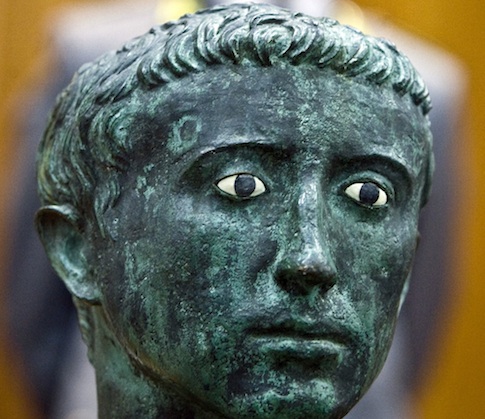The legacy of Rome’s first emperor still offers lessons—and warnings—in leadership and statecraft for politicians 2000 years after his death, experts and historians said on Wednesday.
Augustus rose to power in 31 B.C. during a tumultuous period for ancient Rome, which had been ravaged by decades of civil wars. The situation he faced was not unlike the emerging era of international disorder today, participants said at an American Enterprise Institute (AEI) event on the Roman ruler.
Augustus is remembered for returning peace and stability to the expanding Roman Empire and for making its citizens feel pride in their country again. In contrast to Augustus’ time, today’s dominant political system—liberal democracy—is under attack both in the United States and abroad, said Jonah Goldberg, AEI fellow and a nationally syndicated columnist.
Goldberg noted recent polls showing that more than three-fourths of Americans no longer trust the U.S. government to do the right thing. The growth of the state and its complexity tends to "reward the people who have the wits, the wherewithal, and the lawyers to game the system," he said. And some commentators have even suggested that the United States should adopt a more authoritarian government, like China’s, to meet the challenges of the 21st century.
"There’s a legitimate sense [among Americans] that the system is being rigged from within to reward those with access to the system," Goldberg said.
"I wouldn’t be surprised in 10 years if we hear more calls for an Augustan strong man to fix the system, because the system seems to be failing for a lot of people," he added.
Democracy is also losing its legitimacy abroad, Goldberg said. Newly re-elected Hungarian Prime Minister Viktor Orban said in July that he would seek to model his administration after "illiberal" and "successful" states such as Russia, Turkey, and China.
President Barack Obama’s administration is partly to blame for the souring prospects of democracy around the world, said Jakub Grygiel, a professor at Johns Hopkins University’s School of Advanced International Studies. The convergence of revisionist nations such as Russia and China who seek regional territory and power, along with a permissive international environment no longer led by the United States, has contributed to multiplying crises in Syria, Iraq, Ukraine, and the Asia-Pacific.
While Grygiel said there have always been "states or leaders that are not happy with the status quo," the more "inward-looking" Obama administration has devalued deterrence and encouraged these actors to test the rules of the international system. The administration tends to view the world as harmonious and self-balancing, he said.
"The outcome [for the administration] is we don’t have to do anything in international relations—the world will fix itself without our presence," he said.
"Rebuilding [U.S. deterrence] is going to take a lot of time and effort and be very costly," he added.
Historians at the event said it is difficult to draw direct parallels between the 21st century and Augustus’ time. Still, today’s leaders can draw lessons from how the Roman emperor handled disorder—as well as notes of caution.
Although Augustus was essentially a military ruler who was responsible for a significant death toll, he behaved "no better or no worse than all the dictators of the time," said Adrian Goldsworthy, a historian and author of the new book "Augustus: The First Emperor of Rome." He restored stability to the Roman world for the first time in two centuries, expanded its borders, interacted frequently with the public, and demonstrated statesmanship to meet challenges as they emerged.
"I don’t think he goes into politics with this sense of, ‘this is what the regime should be, I’ll conform it to this,’" Goldsworthy said. "The Romans tend to be more pragmatic than that."
Today’s political leaders, by contrast, seem to lack a governing vision, he said. They focus more on demeaning their opponents rather than proposing their own solutions.
"When you get to that mentality you’re in serious trouble, because no one can do anything," he said. "You have to create those extraordinary measures."
Augustus gave himself immense power over time despite keeping the trappings of republican government, such as the Senate, Goldsworthy said. A decline in democracy today could also be disguised if people become "complacent."
"That decay isn’t very quick," he said. "Most people can keep on living their lives. It seems OK because there’s nothing to push it over the edge."
"That’s probably still true in the short term," he added. "It’s not going to collapse into anarchy and civil war. But it doesn’t mean those things will never happen."
